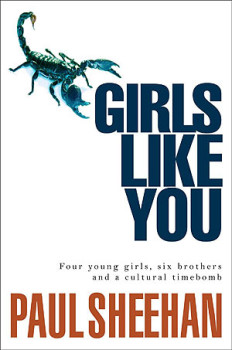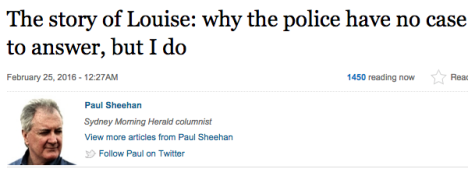SMH columnist: I should not have written Middle Eastern rape column without fact checks
Sydney Morning Herald writer Paul Sheehan has today said he should not have written a column containing detailed allegations about a gang rape in Sydney without checking whether it was true.
Sheehan’s column, which was published on Monday, alleged that Sydney police had failed to act on the woman’s allegations in which she claimed to have been the victim of a rape gang in 2002 featuring men speaking Arabic.
In his original piece, Sheehan quoted alleged victim “Louise” as using the term “MERC – Middle Eastern raping c—s”. The piece also included explicit details of the humiliating ordeal the woman was alleged to have experienced. The level of detail went far further than would usually be the case in a newspaper.
In today’s column, Sheehan said that it has since emerged that the woman made similar claims of rape at rallies organised by the radical anti-Islam group Reclaim Australia. He writes: “I had not considered the possibility that her story had been carefully constructed on a foundation of embellishments, false memories and fabrications.”
Sheehan has previously linked gang rapes with a “cultural timebomb” centred on Middle Eastern immigration to Australia.
The column has now been removed from Fairfax Media’s websites and rewritten with most of the claims made by the woman, along with the racial slurs, removed. A correction has also been published.
The Sheehan controversy has a number of parallels with an infamous episode of journalism in the US just over a year ago in which Rolling Stone magazine reported details of an alleged gang rape on a university campus based on the testimony of a single alleged victim “Jackie” without proper fact-checking.
The 2014 article was later retracted by the publication and labelled “the worst journalism of 2014”.
The original column began to fall apart within hours of it being published, with the alleged victim no longer taking his calls. Sheehan writes:
“At 6pm on Monday I had a heart-sinking conversation with Louise, the woman who was the subject of my column that day.
“In my third conversation with her that afternoon, as I was saying that she needed to talk to the police about the gang rape she alleged took place in 2002, she told me I was ‘oppressing’ her.
“Then she said: ‘I don’t want to continue this conversation,’ and hung up.
In today’s article, Sheehan said he owed an apology to NSW Police for claiming they had failed to investigate the woman’s allegations. He said: “I acknowledge that there was not enough definite information to justify writing the story”
In his defence, Sheehan said he had Googled the woman’s name before publication and hadn’t found anything that made him doubt her claims. He writes:
“The default position in listening to claims of sexual assault is empathy, but for journalists empathy has to be accompanied by an interrogatory quest for detail, consistency and conviction.
“She did provide detail, consistency and conviction. She did speak with an authentic voice about the milieu of homelessness, drug addiction and prostitution in and around Kings Cross and Darlinghurst.
“She did address the fact that she had psychological problems.”
Sheehan concludes:
“In the story recounted to me by Louise, she made insulting references to rapes committed by Middle Eastern men. I had wrongly amplified this insult by including her words in the column.
“Had I known on Sunday what I knew by Wednesday, the column would not have been written. Hindsight has a ruthless clarity.”
 In 2006, Sheehan wrote the book Girls Like You: Four young girls, six brothers and a cultural timebomb.
In 2006, Sheehan wrote the book Girls Like You: Four young girls, six brothers and a cultural timebomb.
At the time a review of the book in his own newspaper said of his writing: “He links the Cronulla riots to the rape cases and asks ‘how many other cultural time bombs were ticking amid the Muslim male population living within the liberality of Australia’. This seems to imply that Muslim men are more prone to violence, sexual or otherwise.”
Tim Burrowes




No apology. Part of a theme in his work. Disgusting.
Remember this is the same man who spruiked the curative properties of “magic water”. Hard to recover any semblance of credibility after that.
It’s time that Fairfax cut loose this dinosaur. Sits on a hefty salary for writing two columns a week on pretty much whatever he chooses, and still gets stuff like this wrong. Anybody else would be sacked for a mistake like this. The Australia’n’s Media section is going to have a field day with this as the main course of Monday’s usual Fairfax-bashing, and this time I’m with the Oz.
I’m floored, the original story was devastating and made NSW police look worse than incompetent. That it was published on the sole telling of a ‘victim’ is astounding and it makes every journalist’s job many degrees harder than it already is. SMH’s editor needs to also shoulder some blame here for waving this through.
I think Sheehan needs to apologize to the whole middle-eastern diaspora for this one.
His “research” and “fact Checking” into what was by any account, a sensational and highly inflammatory set of claims, consisted of googling her name. Astounding. Fairfax, you need to act on this. Completely unacceptable journalism. And frankly, this piece of garbage doesn’t justify the use of the term “journalism”. Independent, always? HOw about accurate. Rarely.
C’mon people, he did at least “Google” her. What more do you expect of today’s penetrating investigative journalists?
Shabby.
When reading it I thought the inclusion of the derogatory language the subject used to describe her alleged perpetrators was an unusual journalistic decision. It was such a graphic article, that I persevered reading through it line by line, in order to ‘inform’ myself. Now finding that it is false, I feel disgusted having read it.
A racist, writing racist crap. Our media has gone to shit.
The “Sydney tissue lady” as she introduced herself at the April Reclaim Australia Rally was obviously a nutter.
Check out this video for her whole unbelievable tale.
https://www.youtube.com/watch?v=60Je6SGMFRQ&sns=em
Why does the SMH persevere with Sheehan? I know he is the token right-winger at the paper, and it is Fairfax policy to have one conservative writer on each of its newspapers to provide “balance”, but with 78 percent of this country’s newspapers owned by Murdoch who doesn’t even bother having token left-wingers on any of his papers along with the myriad shock jocks and Sky News – Australia’s Fox News – I think the conservative viewpoint receives quite enough coverage, in fact far too much.
Fairfax will never increase it’s subscriber base while pandering to nutters via nutters like Sheehan. They’re sacking from precisely the wrong places…
of course, from the newspaper who endorsed Tony Abbott – an epic idiot and disaster.
Agreed TS, but “conservative” is the wrong word to describe these people – try “reactionary” instead.
I like many of his columns, even some of the provocative ones, and I’m no hardcore right-winger. But even when I was reading this one I thought it seemed a serious stretch. Why was this one let through? One thing I will say though is at least Fairfax and its columnists actually admit to their errors! News Corp wouldn’t dare. And as if they don’t make up crap daily!
Lifelong SMH reader growing very disillusioned. Notice The Aus is breaking diverse and interesting material and remaining less tabloid than SMH. But those News Ltd biases are very blatant.
I’m with Julius. The Oz has not improved. The SMH, AFR and Age have sunk badly. All have far too many “celebrity” columnists who tell you nothing and indulge their own fantasies without much variety. The Oz has so much editorial space that they still have to put news stories in there.
Julius, if you are only growing disillusioned after a lifelong readership, you must be still on the youthful side. It beggars belief that the Herald could publish such a story without a criminal-court level of evidence to back it up. How often do they have to be dragged through the courts before they learn? Or, to put it another way, how much longer can Fairfax stagger on?
Sheehan is a good example of why I no longer read smh, having been a reader of the paper and website for 30 years. It’s dumb, amateur, biased, cheap journalism. If they are losing people like me, the game is up.
When I think of some of the great journos that have come and gone from Fairfax in recent years, it makes me wonder why they still put up with a clown like this.